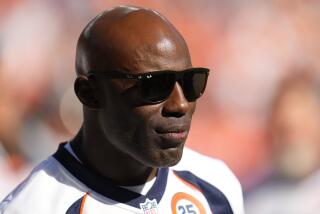Supreme Court backs Secret Service arrest of man confronting Cheney
- Share via
WASHINGTON -- The Supreme Court shielded two Secret Service agents from being sued for having arrested a Colorado man who confronted former Vice President Dick Cheney on the street and said his “policies on Iraq are disgusting.”
The justices said citizens are not protected from a “retaliatory arrest” if police or federal agents have probable cause to take the person into custody.
In the Cheney case, a judge said the agents had reason to arrest Steven Howards, the protester, because he had bumped the vice president.
“This court has never recognized a 1st Amendment right to be free from a retaliatory arrest that is supported by probable cause,” said Justice Clarence Thomas. Such a right was certainly not “clearly established at the time of Howards’ arrest,” he added.
Public officials are usually shielded from lawsuits for carrying out their duties unless they violate a constitutional right that is understood and “clearly established” in law.
The decision was unanimous, although Justices Ruth Bader Ginsburg and Stephen G. Breyer did not join Thomas’ opinion. They said they voted to shield the Secret Service agents because they had a duty to make “singularly swift, on-the-spot decisions” to protect the lives of high officials. However, had the two been “ordinary law enforcement agents,” the justices said they would have allowed the suit to go forward. Justice Elena Kagan sat out the case of Reichle vs. Howards.
It began on June 16, 2006, when Howards spotted Cheney emerging from a shopping mall in Beaver Creek, Colo., and chatting amiably with several people. Howards approached the vice president and allegedly pushed or touched him on the shoulder as he voiced his criticism.
Nothing happened immediately, but Gus Reichle, a Secret Service coordinator on the scene, heard about the incident from other agents. He then confronted Howards, accused him of an assault and ordered his arrest.
Howards was detained for several hours and released. No charges were filed against him.
He then sued Reichle and agent Dan Doyle and accused them of violating his 4th Amendment rights against an unreasonable seizure and his 1st Amendment right to the freedom of speech.
Last year, Howards won a split decision from the U.S. Court of Appeals in Denver. Its judges said his arrest was reasonable and lawful, but they nonetheless agreed he could sue the agents under the 1st Amendment for arresting him in retaliation for his critical words.
The Obama administration and lawyers for Reichle appealed to the high court and urged the justices to block the suit from going forward. They argued that it made no sense to hold that an agent could be held liable for a lawful arrest. They also said agents must be able to act quickly to protect the president and vice president, and they should not fear being sued later.
More to Read
Get the L.A. Times Politics newsletter
Deeply reported insights into legislation, politics and policy from Sacramento, Washington and beyond. In your inbox twice per week.
You may occasionally receive promotional content from the Los Angeles Times.











